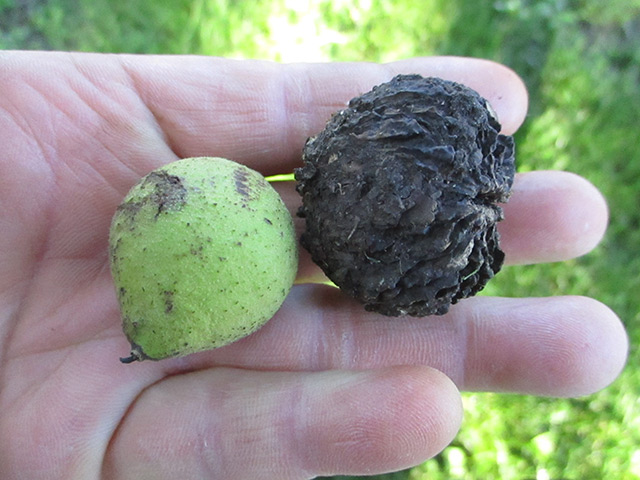Here are 5 reasons to add black walnuts to your next meal

(Natural News) Compared to English walnuts (Juglans regia), black walnuts (J. nigra) have a bolder and earthier flavor. Black walnuts are full of anti-inflammatory compounds and offer many health benefits, such as boosting your heart health and lowering blood pressure.
The nutrient profile of black walnuts
Black walnuts have three main components responsible for their health benefits: antioxidants, polyunsaturated fats, and phenolic compounds.
Black walnuts also contain vitamins and minerals, such as:
- Copper
- Folate (a type of B vitamin)
- Iron
- Magnesium
- Manganese
- Phosphorus
- Potassium
- Selenium
- Zinc
Below are some of the health benefits of adding black walnuts to your regular diet.
They can help prevent neurological diseases.
Black walnuts are full of ellagitannins, a class of polyphenols with anti-inflammatory and antioxidant properties.
According to an article published in Critical Reviews in Food Science and Nutrition, ellagitannins can help prevent the onset and progression of neurodegenerative diseases such as Alzheimer’s disease, amyotrophic lateral sclerosis, and Parkinson’s. (Related: Eating nuts found to dramatically improve “brainwave functions” linked to memory, creativity, performance and intelligence.)
They can lower your risk of developing heart disease.
Like other nuts, black walnuts are rich in fatty acids and antioxidants that support cardiovascular health.
According to a review published in the International Journal of Food Properties, there is a positive link between high consumption of nuts and lower risks of heart attack, heart disease, and sudden cardiac death.
 | Discover how to prevent and reverse heart disease (and other cardio related events) with this free ebook: Written by popular Natural News writer Vicki Batt, this book includes everything you need to know about preventing heart disease, reversing hypertension, and nurturing your cardiac health without medication. Learn More. |
They can lower your blood pressure.
Black walnuts contain an amino acid called arginine that gets turned into nitric acid in the body.
The conversion of arginine to nitric acid also produces nitric oxide, which functions as a vasodilator. Vasodilators enlarge blood vessels and help lower blood pressure.
Black walnuts provide 3.62 grams (g) of arginine per 100 g serving. On the other hand, English walnuts provide only 2.28 g of arginine per 100 g.
They can improve cholesterol levels.
Walnuts have phytosterols (plant sterols) that limit the absorption of cholesterol in the body. This helps lower blood cholesterol levels.
Black walnuts have 37 milligrams (mg) more phytosterols than English walnuts.
High cholesterol levels are linked to a higher risk of cardiovascular disease. To improve your heart health, keep your cholesterol levels low by consuming moderate amounts of black walnuts.
They can reduce colorectal, liver, and prostate cancer risk.
In a 2011 study published in the journal Pharmaceutical Biology, researchers discovered that walnut extracts can stop cancer cells from multiplying.
Specifically, chloroform and ethyl acetate fractions of walnuts effectively prevented the proliferation of colorectal and liver cancer cells. The extracts also showed high antioxidant activity.
Meanwhile, American researchers recently reported that y-tocopherol, a compound found in abundance in black walnuts, inhibits the growth of prostate cancer cells.
While scientists have yet to determine the right dose of y-tocopherol for human treatment, they are hopeful that the compound can one day be used to help minimize prostate cancer risk.
Incorporating black walnuts into a healthy diet
When buying shelled black walnuts, choose products that have undergone minimal processing and preparation. This ensures that the walnuts still contain most of its nutrients and active compounds.
Add black walnuts to various dishes like appetizers, desserts, entrees, salads, and side dishes. Alternatively, you can purchase black walnut supplements or consume the nuts with other nutritious fruits and herbs like cranberries, Echinacea, and garlic.
Considerations before eating black walnuts or taking supplements
For your safety, consult a physician before you start taking supplements and read the directions on the package. Black walnuts may interfere with how well your body can absorb certain medications.
It is generally safe to consume black walnuts in small amounts or to take them as supplements on a short-term basis.
However, some individuals have reported allergies after eating black walnuts. Other side effects include stomach issues after taking black walnut supplements or eating the nuts. According to physicians, breastfeeding or pregnant women should avoid taking black walnut supplements.
If you want to boost your heart health and lower your risk for certain cancers, follow a balanced diet and consume fresh walnuts or consider taking black walnut supplements.
Sources include:


